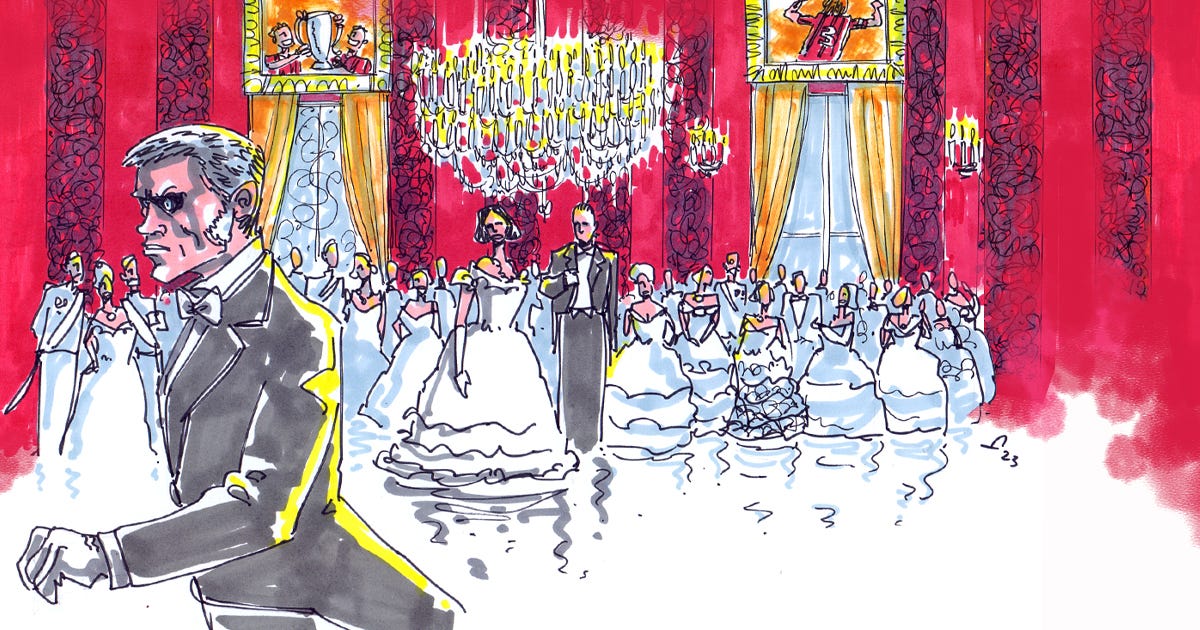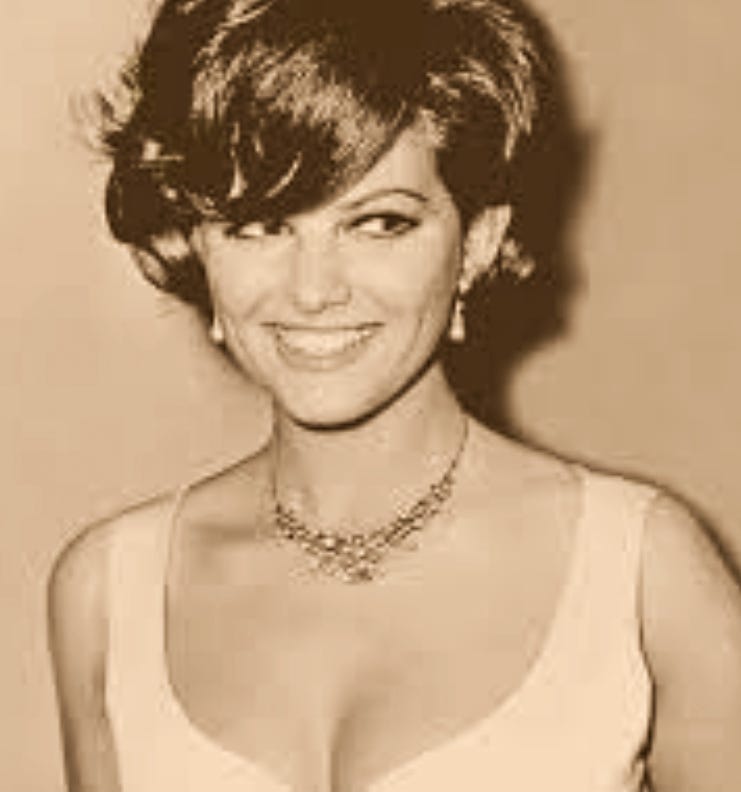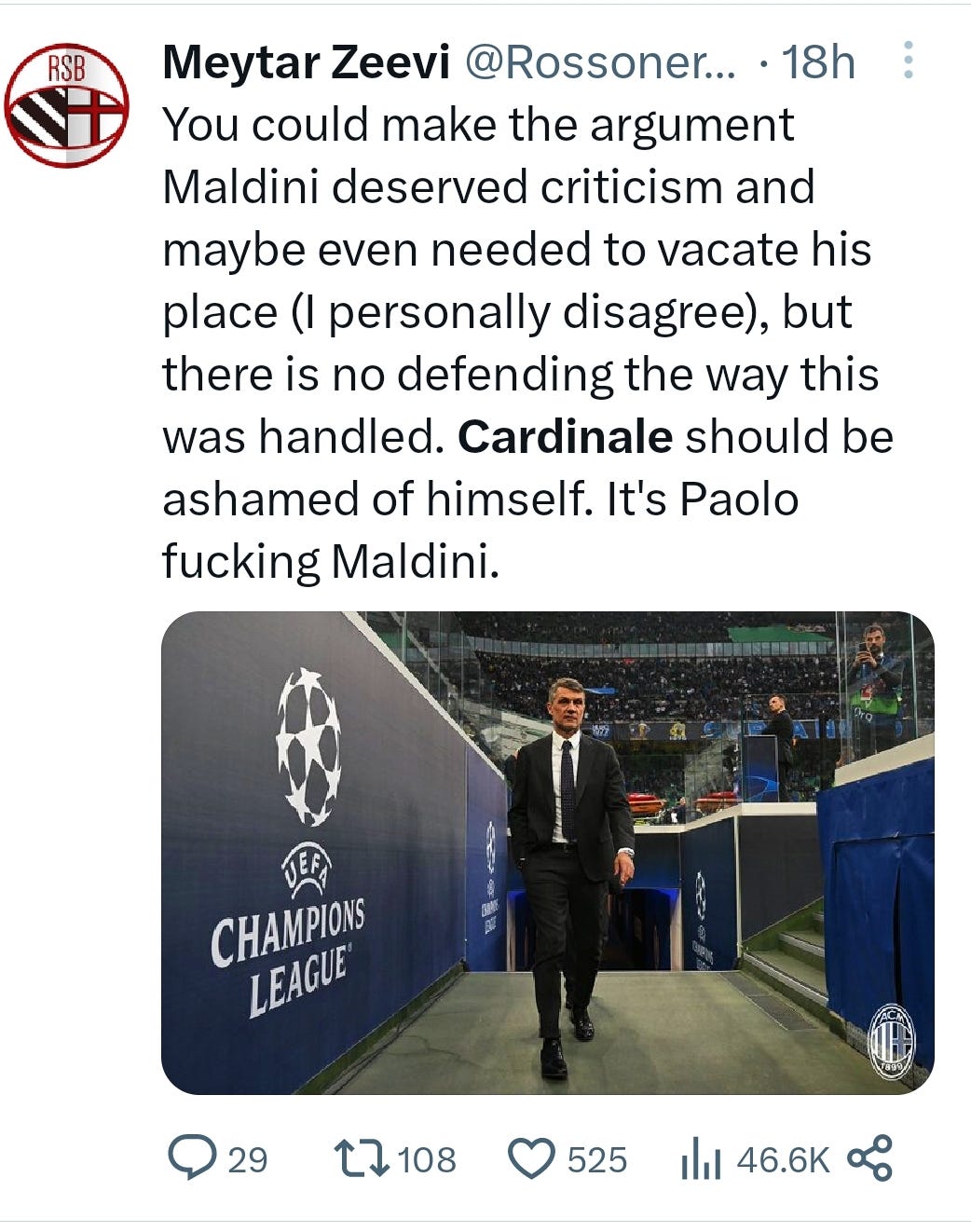Paolo Maldini, Il Gattopardo.
It's impossible to reconcile the needs of a Paolo Maldini, and his personal pride and ambition, with the required financial straight-jacket Gerry Cardinale has put himself into at AC Milan.
The Albachiara Journal is an eclectic collection of our opinion and perspective, from our travels and encounters.
Claudia Cardinale formed part of the 1960s triumvirate of Italian actresses that conquered Hollywood, along with Loren and Lollobrigida. Considered by many the most beautiful and intriguing of the three, with her Tunisian background, she embodied feminine “class” for that moment in time, and was highly in demand from Federico Fellini, to Sergio Leone, to Luchino Visconti.
Che bellezza!
The latter directed her in the classic film Il Gattopardo (The Leopard), alongside Burt Lancaster and Alain Delon. It tells of the old Sicilian aristocracy, in 1860, coming to its end, under the political upheavals from the Re-unification (Risorgimento) of Italy. Few realise how young a country the new Italy is, and how this period was as dramatic for them, as the revolutions were in France and Russia.
Martin Scorsese considers the film to be one of the greatest ever made. It’s like a Doctor Zhivago. Epic.
An imperial Burt Lancaster plays the old Prince (Il Gattopardo) not really wanting things to change, but deep down realising they will. And it’s killing him.
“Sicily prefers its traditions, to the delusions of modernity, because its people are proud of their ancient heritage”.
Sounds like Grant Williams and golf, does it not?
Il Gattopardo sees a near future where the upper-classes, (the leopards and the lions), will all have to live with the sheep and the jackals in the same society, according to the same laws; and he just does not want to be a part of it. The sheep and the jackals, again with the golf analogy, would be Riggs and LIV, as I see it.
Afflicted by a combination of melancholia and disdain for the nouveau riche, Il Gattopardo wanders forlornly, until Claudia Cardinale, his god daughter, asks him to dance at the big Ball. Stirred, and momentarily released from his cares, the Prince accepts, and for an instant he recaptures the elegant and dashing figure of his prime.
This is great acting from Lancaster. In the end, he leaves the Ball alone, and walks with a heavy heart to a dark alley, that clearly symbolises Italy’s and his fading past.
This scene is undoubtedly as famous, if not more so, than Pacino in Scent of a Woman. Lancaster’s gaze at the end is like the old sports industry coming to terms with its time now over.
New York magazine called it “almost unbearably moving“. The New York Times wrote “25 minutes can transform a very good film into a great one“.
This is Hollywood the way Scorsese envisages it: with true stars, telling epic stories. Do we want to comment on Alain Delon in this scene?
Marvel Universe my arse. Sigh!
When Gerry Cardinale came onto AYNE, three years ago, it immediately reset the standard for sport biz podcasts like ours, and our rivals. There was before and after the Cardinale episode. The bar was raised, as Giles Morgan had told me it would be. Off-air, afterwards, I pleaded with Gerry to confirm to me that Claudia was some kind of great aunt of his. He replied:
“I hear you. Only our generation truly appreciates that!”
I instantly developed a very soft spot for him, and that will inform this Sunday Column. I am slightly biased.
This week Gerry Cardinale had to let Paolo Maldini go.
I think everyone reading this column will know who Paolo Maldini is, so I am not going through the whole travelogue. Youtube will help you if needed.
Arguably the greatest defender of all time, a giant of a player, in his ability, his achievements, his class, decorum, and sportsmanship. With the looks as well, he was the whole fucking package. And the expletive doesn’t do this justice. Football has a way of judging the greats, and Paolo is just seen as “proper”, and magnificent. Achilles in his glory. He would become the heart and soul of his only club for over 20 years, winning 7 Italian titles, and 5 Champions Leagues. Considered the greatest symbol and emblem of the red and black, surpassing even his own father. A gentleman and a true footballing icon, likely in every single person’s team of all time. It doesn’t get any better than this in our sport.
I first saw him in 1986, as a 17 year old already fully broken into the Milan team, recently bought by Silvio Berlusconi. Those were the days before wall-to-wall live games, social media, and so much commentary on players and tactics. So I can’t say here that he caught my eye, as then we all were watching Diego Maradona about to win the first scudetto for Napoli, and take the mantle of the world’s greatest player from Michael Platini at Juventus. The young kid wasn’t the news story. The next year, however, the play-off match, between his club and Sampdoria for European qualification, was televised live. Maldini had a superb game, and, as if yesterday, I remember the commentary about a young man “with an important surname, destined to be the future of the club”.
It seemed a bit of hyperbole to me; but they all knew.
Make no mistake, Paolo Maldini is Il Gattopardo here, the old leopard. The elegant and dashing figure of the past, …”increasingly disaffected by the entire edifice of the society he so gallantly represents”; in this case, the storied football club of AC Milan, and indeed the whole modern industry of football, now ravaged by market forces.
Paolo comes from my generation of what football is. When the natural hierarchy of things still dominated, and big clubs built teams to win things. Not when minor clubs like City and PSG could be bought and doped up to win trebles. The reader here needs to understand this. Maldini, like the old Prince, comes from a different era and mentality.
Even by my own low standards of what I expect from football fan reaction, what is happening now is visceral stuff. I can never understand football fan emotion over things that should be as plain as the nose on their face. The manager of Celtic feels the need to go and prove himself on the big stage? Utterly understandable and predictable. It’s exactly as obvious that a world-class professional investor will run the club he has bought within prudent parameters on player costs. I’ll add in here the same certainty that Jude Bellingham prefers to live and play in Madrid than on Merseyside.
But no; all hell always breaks loose.
Cardinale this week has been given a serious kicking in the (social) media and football community. Players at Milanello are apparently in revolt. Ex colleagues of Maldini are all whispering that the American has no money at all to spend.
I would not be advising him to come to Milan soon. This tweet is very mild. But the expletive again says it all.
What’s unclear to me, is how much Cardinale knew this was coming, and had braced himself. Or did he underestimate the real power of brand? I sense a lot of these US investors into sport are assessing the game from where it is today; as opposed to where brand really sits. In their head, they have a ranking where a Chelsea or Tottenham is a bigger club than AC Milan.
This is AC Milan, and this is “Paolo fucking Maldini“.
With a club like Chelsea, sure, the fans will get angry over stuff, but let’s be honest, at the end of a Saturday, a lot of them are going to Annabel’s, or some swanky restaurant in Mayfair. The disappointments of the game pass quickly in what is just another element of their social calendar. This is the difference between middle and working class sport. In the King’s Road, football is an element of their lives; in San Siro, it is all their lives.
The market distortions driven by money have confused people.
Fulham is not bigger than Celtic, Chelsea is not bigger than AC Milan.
But even still, I don’t think Cardinale will have made this mistake. He won’t have underestimated the horrendous optics of the Maldini departure. Furlani is a big, big Milan fan. Scaroni also, I guess.
So I think he knows from them the impact, I just believe that he had no choice. I hope he hasn’t been listening too much to the American people around him, from Billy Beane down. I hope he’s listening to Scudamore.
No, if any blame can be pushed his way, it’s the finance one I have thrown at all the new guys.
European sport is underpriced risk.
That article here , is still the most popular of the Sunday Columns. The inherent risk in the project, not shown in the data room. Maldini leaving was underpriced risk for Redbird.
It is only weeks ago I saw Cardinale in the stands at the Tottenham game, like Caesar in his pomp, and rightly so.
So this is no “et tu Brute?” article from me.
I am not sliding in the dagger with the easy “Americans just don’t get European football” line. I won’t even go back to the perceived lack of EQ from Pallotta, with Totti and De Rossi, in Roma (you can read that article here if you want).
What’s happened is a clear structural and generational problem; the impossibility and inevitability of some things. The perfect-storm crashing of oceans, around Drake Strait, that the whole sport sector is now facing.
It’s why these columns and AYNE have been in the main ahead in calling what was going to happen in sport. Some things just cannot be avoided.
What has led up to the “mutual consenting” of Maldini this week, and what does it mean?
After retiring as a player, he had distanced himself from the club for at least a decade, before returning in 2018 as Sporting Director. The club was in a sorry state, but remarkably, they won SerieA in 2021, with a team assembled under his gravitas and leadership. Maldini had brought in Ibrahimovic to bring a winning mentality to that dressing room. This year they reached the semi-final of the Champions League.
No-one had expected them to be anywhere close to being this competitive again, and anyone with any true knowledge of the game knows that they were punching well above where their squad should have been. Maldini knew, more than anyone, that the players and the club were still well short of being the force of 20 years ago, and that it needed to kick on. That was his pitch to Cardinale.
If someone like Maldini does something, it’s going to have to be in a reach for greatness. That’s what leopards do. They don’t change their spots. They can’t. Maldini had no choice really.
And there’s the rub.
Any club in Italy cannot financially compete to be “great”, against monies coming from Arabs and crazy Americans in Chelsea.
Cardinale knows this. And realises what he needs to do, since acquiring the club from Elliot last year.
Elliot, the vulture investors, had claimed ownership of AC Milan 5 years ago, under foreclosure, after the previous Chinese owner Mr Li could not pay them the money he borrowed from them. Elliot, under Giorgio Furlani, had then managed the club tightly, with Ivan Gazidis and Maldini, and had stabilised the C Suite, bringing in Paolo Scaroni as President. Scaroni is one of the big beasts of Italian capitalism, commanding instant respect amongst the locals and the capitals markets. The club now was, and is, solid.
But Elliot are not football investors; it’s not their asset class. They are basically lenders, of the coldest coldest kind. They will chase you down if you don’t pay them back, like LeFors in Butch Cassidy. The best and funniest example of this is the Argentinian warship they seized in Africa after they didn’t get paid by the Buenos Aires govt. Dont believe me? Read here.
You do not want to be owing money to Paul Singer’s Elliot!
Enter Gerry Cardinale and Redbird Capital, one of the modern breed of Americans investors deploying smart capital into sport. Cardinale bought AC Milan for £1.2bn, a very full valuation. It was at the time, and more so now, with higher costs of capital.
I am a fan of Cardinale, as admitted. He is an alpha male; a Rhodes scholar, an achiever, a true leopard himself. As a financier he is opportunistic and innovative with structures. In the case of buying AC Milan, he financed it with what is called vendor debt. That means the person you are buying it from, lends you the money. Elliot has lent Redbird maybe as much as half of the $1.2bn to buy Milan. At a reported 15%. That’s 90m in interest a year on my calculator. Not banal.
These interest costs are going to be rolled up (PIK, like with the Glazers in United, I think).
The debt will thus build on itself.
These figures are disputed but let’s use them. Its the principle, not the actual numbers, that matter.
Redbird has taken $600m in debt, from the coldest lender in town, at an eye-watering 15%. The Elliot man Furlani is now the CEO. Scaroni is an Italian and, let’s say, will always play to his domestic audience. His loyalty won’t be fully to Redbird.
This isn’t a slam-dunk deal.
Me opining on the corporate finance structures of Gerry Cardinale is like Postman Pat telling Enzo Ferrari how to build a fast car. I am not worthy, and I wouldn’t dare.
But I’m good at joining the dots from afar. Whichever way you cut it, like I say; you do not want to be owing money to Paul Singer’s Elliot.
If all these PE deals in sport are a bet on rising broadcast rights, Cardinale’s bet to me seems clear to summarise. He thinks the asset valuation of AC Milan will get to say $3bn, so he can pay back Singer and his PIK interest of 90m a year. He’ll also look to refinance soon, and hopefully get Elliot out. But he needs franchise values to go north; and in the meantime to control costs.
Below is Gerry‘s general thinking on his football strategy, alluding to the multi-club risk-sharing portfolio approach. Its sound and fit for purpose for the 2023 industry.
Each can have a view on the likelihood of pulling that off. Personally,
I have major doubts that investors can get money back on buying European football clubs. Especially as the cost of capital has now risen.
Let’s remember Logan Roy from last week:
“As a business vision, European football is a fucking basket-case of stupidity. Every fresh penny they make, whoring their product out, is pissed away the same day.”
Unless there is a hard salary cap, I believe European football isn’t investable in the way Big Finance thinks.
That is going to annoy a lot of my mates and fans of this column. Sorry. But that’s my conclusion.
So, anyway, with Singer holding the IOU and having the CEO as an ex employee, Redbird is obliged to, and will, run a very tight financial ship at AC Milan. Cardinale is de facto forced to operate his own internal “hard salary cap” to control costs, because his top line revenues at the club aren’t growing. They may even contract if the Serie A rights deal isn’t good, which I don’t think it will be.
Let’s come back to “the rub” then. This is the take-away.
…
To continue reading this article, including the meaning behind the incredible artistry accompanying this piece, please click here.








